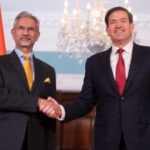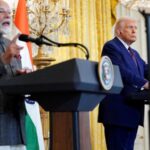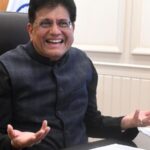India joins U.N. conference on Palestine hosted by France and Saudi Arabia, but stays on the sidelines, won’t lead working groups formed
India joined the call for Israel to end the war in Gaza and ensure access to food, for Hamas to return hostages, and for U.N. members to recognise the Statehood of Palestine at a United Nations conference co-chaired by France and Saudi Arabia, but stayed on the sidelines of the major working groups formed.
In a speech late on Tuesday (July 29, 2025), Indian Ambassador Parvathaneni Harish said that in 1988, India was one of the first countries to recognise the Palestinian state, and it is now time to focus on the steps required for practical solutions, not “paper solutions” to help the situation.
“Our efforts must now focus on how to bring about a Two-State solution through purposeful dialogue and diplomacy, and bringing the parties to the conflict to engage directly with each other,” Mr. Harish said while speaking at the conference that began on Monday (July 28, 2025), with France announcing it plans to recognise Palestine by September 21, making it the first G-7 country to do so.
U.K. Foreign Secretary David Lammy also addressed the conference, saying the U.K. would recognise Palestine at the U.N. General Assembly session in September, unless the Netanyahu government acts to “end the appalling situation in Gaza, ends its military campaign and commits to a long-term sustainable peace based on a two-State solution.”
147 of 193 U.N. members have recognised Palestine’s statehood thus far, with many more called on to do so in a 25-page outcome document titled ‘New York Declaration on the Peaceful Settlement of the Question of Palestine and the Implementation of the Two-State Solution’ at the end of the conference, before the UNGA starts on September 21.
While India was an early backer of the Palestinian cause, its record on votes and debates at the United Nations after the October 7, 2023 terror attacks has been more reticent, and Indian diplomats have abstained on more U.N. votes on the Israel-Palestine conflict than in the past, including most recently on a ceasefire resolution in June.
“The human suffering in Gaza continues unabated,” Mr. Harish said in address, referring to “tens of thousands” killed, but not naming Israel and the IDF that is accused of bombarding, blockading and starving hundreds of thousands inside Gaza.
“Let us also not forget the plight of the hostages and their families. There can be no justification whatsoever for terrorism, for addressing any root cause or political grievance,” he added, but did not name Hamas, which carried out the October 7 attacks and took 251 hostages, of which many have been released or died, and about 50 believed to still be in captivity.
The Modi government’s decision to participate in the U.N. conference but not send a Minister, as had been requested by co-Chairs France and Saudi Arabia, both close partners of India, is seen as a way of balancing its interests with the US and Israel, both of whom boycotted it.
In addition, eight working groups have been set up, focusing on building narratives, promoting international law, security, economic viability, humanitarian actions and other mechanisms for a Two-State solution, but India has chosen not to lead even one of them. Instead, countries like Canada, Ireland, Turkey, Brazil, Indonesia, Egypt, Jordan, Spain, Mexico, Qatar, UAE, Italy, the EU, etc. have opted to co-chair the committees. When asked, official sources confirmed that India would not be co-chairing any of the working groups, but that it would be “part of the discussions”.
Focus on practical not ‘paper’ measures for Israel-Palestine two-state solution: India at the U.N.
India joins U.N. conference on Palestine hosted by France and Saudi Arabia, but stays on the sidelines, won’t lead working groups formed
India joined the call for Israel to end the war in Gaza and ensure access to food, for Hamas to return hostages, and for U.N. members to recognise the Statehood of Palestine at a United Nations conference co-chaired by France and Saudi Arabia, but stayed on the sidelines of the major working groups formed.
In a speech late on Tuesday (July 29, 2025), Indian Ambassador Parvathaneni Harish said that in 1988, India was one of the first countries to recognise the Palestinian state, and it is now time to focus on the steps required for practical solutions, not “paper solutions” to help the situation.
“Our efforts must now focus on how to bring about a Two-State solution through purposeful dialogue and diplomacy, and bringing the parties to the conflict to engage directly with each other,” Mr. Harish said while speaking at the conference that began on Monday (July 28, 2025), with France announcing it plans to recognise Palestine by September 21, making it the first G-7 country to do so.
U.K. Foreign Secretary David Lammy also addressed the conference, saying the U.K. would recognise Palestine at the U.N. General Assembly session in September, unless the Netanyahu government acts to “end the appalling situation in Gaza, ends its military campaign and commits to a long-term sustainable peace based on a two-State solution.”
147 of 193 U.N. members have recognised Palestine’s statehood thus far, with many more called on to do so in a 25-page outcome document titled ‘New York Declaration on the Peaceful Settlement of the Question of Palestine and the Implementation of the Two-State Solution’ at the end of the conference, before the UNGA starts on September 21.
While India was an early backer of the Palestinian cause, its record on votes and debates at the United Nations after the October 7, 2023 terror attacks has been more reticent, and Indian diplomats have abstained on more U.N. votes on the Israel-Palestine conflict than in the past, including most recently on a ceasefire resolution in June.
“The human suffering in Gaza continues unabated,” Mr. Harish said in address, referring to “tens of thousands” killed, but not naming Israel and the IDF that is accused of bombarding, blockading and starving hundreds of thousands inside Gaza.
“Let us also not forget the plight of the hostages and their families. There can be no justification whatsoever for terrorism, for addressing any root cause or political grievance,” he added, but did not name Hamas, which carried out the October 7 attacks and took 251 hostages, of which many have been released or died, and about 50 believed to still be in captivity.
The Modi government’s decision to participate in the U.N. conference but not send a Minister, as had been requested by co-Chairs France and Saudi Arabia, both close partners of India, is seen as a way of balancing its interests with the US and Israel, both of whom boycotted it.
In addition, eight working groups have been set up, focusing on building narratives, promoting international law, security, economic viability, humanitarian actions and other mechanisms for a Two-State solution, but India has chosen not to lead even one of them. Instead, countries like Canada, Ireland, Turkey, Brazil, Indonesia, Egypt, Jordan, Spain, Mexico, Qatar, UAE, Italy, the EU, etc. have opted to co-chair the committees. When asked, official sources confirmed that India would not be co-chairing any of the working groups, but that it would be “part of the discussions”.






NO COMMENT